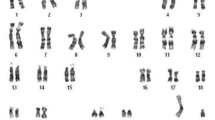Abstract
To study the genetic defect of the human androgen receptor (hAR) gene in the complete androgen insensitivity syndrome (CAIS), we amplified each of the eight exons by PCR in genomic DNA extracted from the paraffin blocks of the resected gonads. We analyzed using SSCP, and directly sequenced the abnormally shifted bands. Mutations were found in 4 cases of CAIS. Patient 1 carried a point mutation; a G to A transition in exon 7 resulted in a change from arginine to glutamine at codon 831. Patient 2 carried a point mutation; a C to T transition in exon 7 resulted in a change from arginine to stop at codon 831. Patient 3 carried a point mutation and deletion in exon 7. A point mutation was an A to G transition that caused a glutamine to be substituted for the asparagine present at codon 819. A deletion of a G at codon 820 resulted in a frameshift and consequently in the introduction of a premature stop at codon 821. Patient 4 carried a mutation in 5’ splice donor site of intron 7; a G to T transition might have caused an abnormal splicing of the exon 7. All of the mutations were found in exon 7. These mutations of hAR gene might be related to the pathogenesis of CAIS.
Similar content being viewed by others
Author information
Authors and Affiliations
Additional information
Received: May 1999 / Accepted: 17 August 1999
Rights and permissions
About this article
Cite this article
Choi, C., Kim, K., Kim, H. et al. Androgen receptor gene mutation identified by PCR-SSCP and sequencing in 4 patients with complete androgen insensitivity syndrome. Arch Gynecol Obstet 263, 201–205 (2000). https://doi.org/10.1007/s004040050284
Issue Date:
DOI: https://doi.org/10.1007/s004040050284



